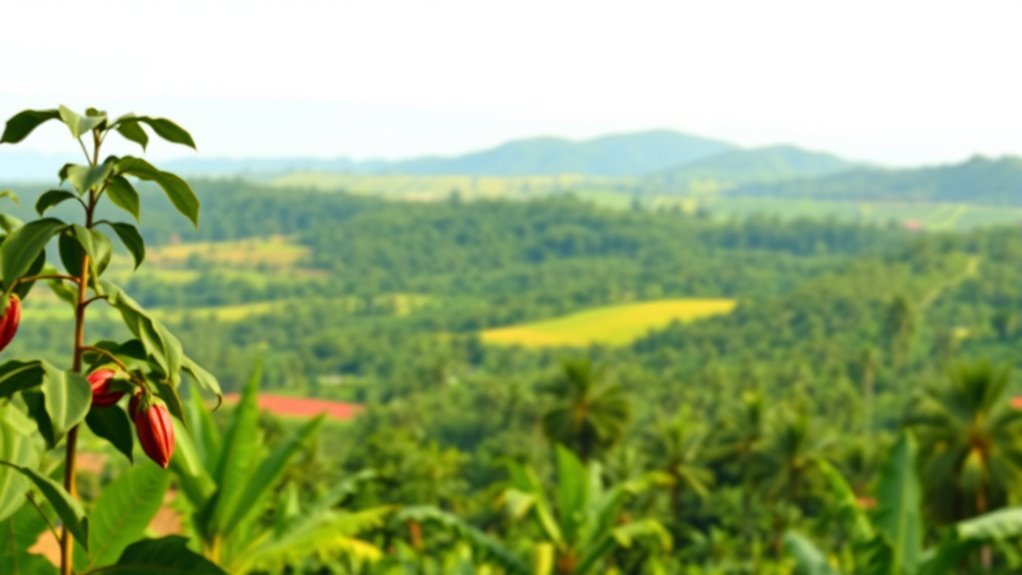The Congo, Republic of the, presents pathways to financial success via resource extraction, agriculture, and small businesses. Responsible resource management requires permits, strategic alliances, and local processing. Agriculture benefits from modern farming, value chain improvements, and farmer training. Small businesses thrive by meeting local needs with competitive pricing and customer satisfaction. Navigating the civil law-based legal environment with counsel is crucial. Investment codes encourage foreign investment; transparency minimizes corruption. More extensive details unlock greater opportunities.
Main Points
- Explore resource extraction, focusing on responsible practices in mining and strategic partnerships for capital.
- Invest in agriculture, particularly coffee and cocoa, modernizing farming and enhancing the value chain.
- Start a small business in retail, food service, or crafts, meeting local needs with effective marketing.
- Navigate the legal landscape by securing legal counsel and staying updated on mining, trade, and investment laws.
- Promote financial success through artisanal mining income, value addition, target market understanding and foreign investment.
Capitalizing on Natural Resources
As the Democratic Republic of Congo possesses vast reserves of natural resources, including minerals like cobalt, diamonds, and copper, resource extraction presents significant economic opportunities. Artisanal mining, while often informal, involves local populations and contributes to immediate income generation.
Successfully navigating the regulatory framework, environmental considerations, and community relations is crucial.
For larger-scale operations, obtaining proper licenses and permits are essential. Strategic partnerships with established companies offer access to capital and experience.
Value addition through local processing could maximize profitability, reducing reliance on exporting raw materials. However, transparency and responsible practices safeguard against corruption and environmental damage.
Investing in Agriculture

Beyond natural resources, agriculture presents diverse investment opportunities in the Democratic Republic of Congo. The fertile lands and favorable climate make it ideal for cultivating diverse crops, including coffee, cocoa, and cassava, both toward import and export value.
Investing in modern farming techniques, infrastructure, and processing facilities can significantly boost agricultural output and profitability. The sector needs improvements across its value chain to realize its huge potential.
- Vast fields of maize swaying in the breeze
- Trucks transporting harvests to bustling markets.
- State-of-the-art processing facilities refining raw goods.
- Local farmers receiving training on sustainable practices.
Thriving in Small Business
Small business ownership presents another pathway to financial success in the Democratic Republic of Congo. Opportunities abound in sectors like retail, food service, and artisanal crafts. Identifying a local need and fulfilling it with a reliable product or service is key.
Success hinges on understanding the target market. What do consumers want? What are they willing to pay?
Competitive pricing and effective marketing strategies are crucial for attracting customers. Building strong relationships with suppliers and customers can foster loyalty and ensure a steady flow of business.
A dedication to quality and customer satisfaction can help to establish a positive reputation.
Understanding the Legal Landscape
Navigating the legal and regulatory environment is crucial for anyone seeking financial success in the DRC, regardless of whether they are a foreign investor or a local entrepreneur.
The DRC’s legal framework, influenced by civil law traditions, establishes the rules for business operations. This includes company formation, labor laws, taxation, and contract enforcement.
Key regulations to consider encompass:
- Mining laws affecting resource extraction.
- Investment codes encouraging foreign investment.
- Customs regulations affecting trade.
- Environmental laws protecting natural resources.
Engaging legal counsel ensures activities comply with regulations. Changes frequently occur, underscoring the importance of continuous monitoring.
Common Questions
What Are the Best Cities for Expats?
The best cities for expats often depend on individual priorities. Brazzaville, the capital, typically offers more amenities. Pointe-Noire has a coastal location and oil industry jobs. Dolisie, or Loubomo, provides a quieter environment, with varied career opportunities.
How Safe Is It to Conduct Business?
Business safety in Congo is a significant concern. Corruption, political instability, and weak law enforcement pose risks. Due diligence, strong local partnerships, and security measures are crucial for mitigating potential threats.
What Are the Cultural Nuances to Be Aware Of?
Cultural nuances involve hierarchical structures, respect for elders, and indirect communication. Relationship-building is crucial, often preceding business discussions. Awareness of local customs and traditions promotes trust and avoids misunderstandings, which affect partnerships.
What Is the Quality of Healthcare Available?
Healthcare quality in Congo is generally poor. Facilities are often under-equipped and understaffed, especially in rural areas. Access is limited, and serious medical conditions may require evacuation. Public health issues, like infectious diseases, are widespread concerns.
How Can I Learn French or Lingala Quickly?
To learn French or Lingala quickly, immersion is key. Language learning apps, online courses, and tutors can aid efficient acquisition. Focus on practical phrases and common vocabulary for quicker conversational abilities.